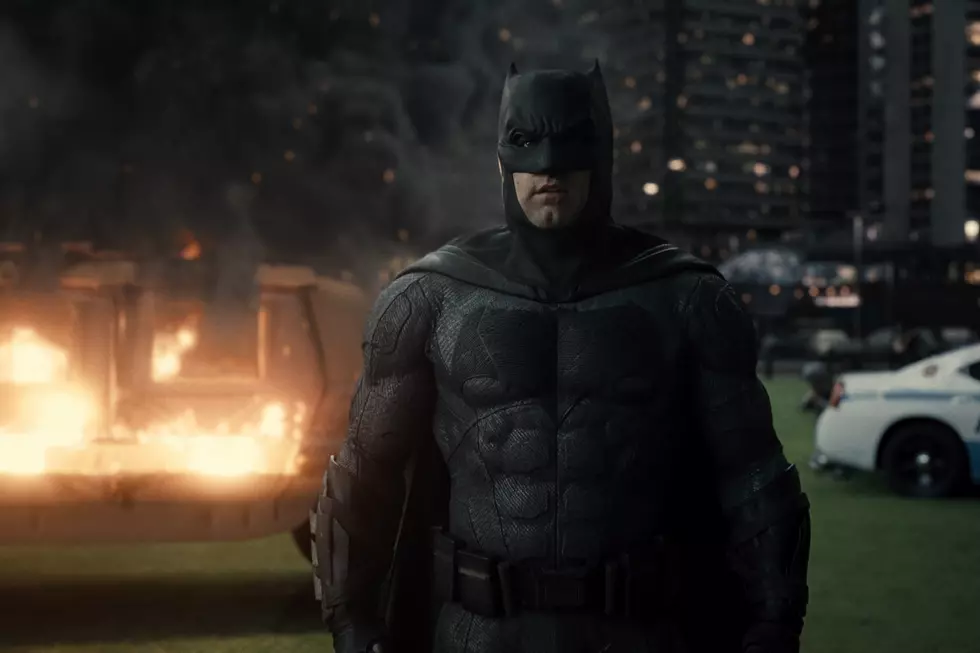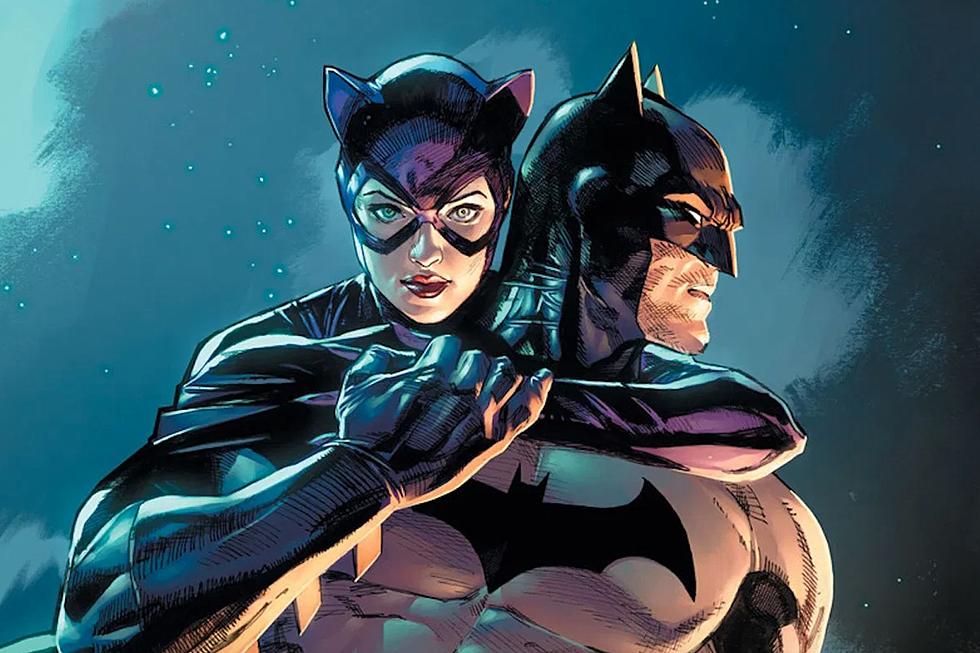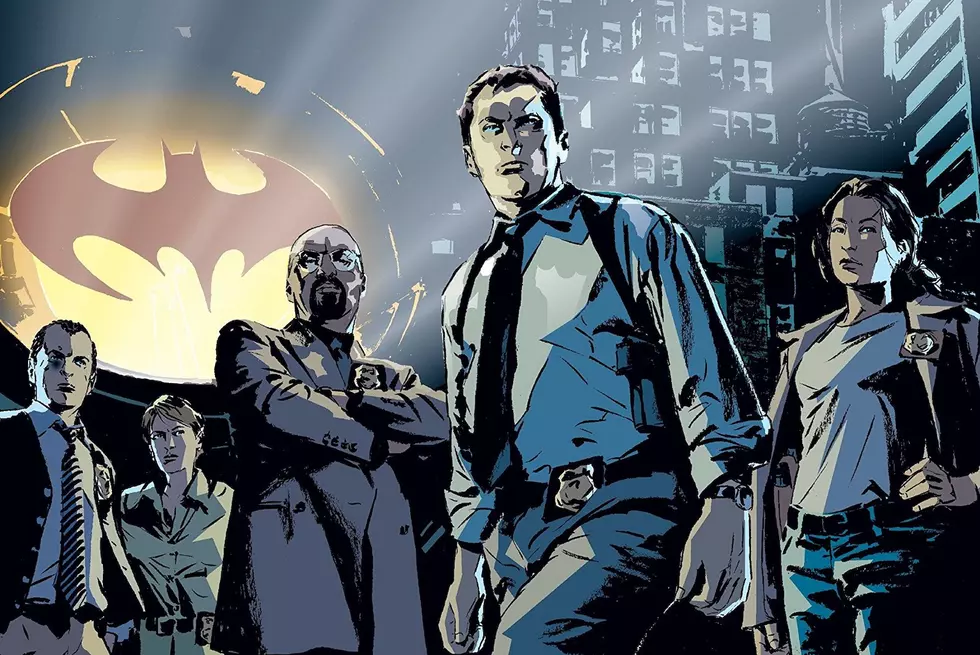
Stop The Press: Vicki Vale And The Superficial ‘Strong Female Character’
Ah, I thought, as the camera panned lovingly down Vicki Vale’s high-heeled, black-pantyhose-clad legs — here she is. The Strong Female Character. The 1989 model had fluffier hair than her successors, but that's really the only significant difference. She establishes her Totally Empowered cred early, makes eyes at the hero, then gets the hell out of the way as he and the (male, naturally) villain go about the business of advancing the plot. She snaps a photo once or twice to remind us that she's a globe-trotting photojournalist — the kind of photojournalist with no compunction toward sleeping with her subjects, but hey, whatever. She ends the film in the hero’s arms, fulfilling her role as reward for his victory, with nary a whisper of the professional goals that drove her to him in the first place. She is pretty and in need of rescue and almost entirely in service to the male characters’ plot and characterization—but she gets to be vaguely spunky and is slapped with a typically male career, so it’s totally okay.
I can only imagine the interviews that took place upon the release of Batman, touting her modernity, her break with the damsels of the past, her ineffable 1989-ness. I’m sure the crew patted themselves on the back heartily for providing the women and girls of America with such a vibrant reflection and role model.
I'm sure of these things because 25 years later, very little has changed regarding how women like Kim Basinger's Vicki Vale are portrayed: superficially empowered and ultimately disposable.
The Strong Female Character sucks. She is not strong, and she’s barely a character at all — although she is, as we are abundantly reminded, female. She is never the hero of the story, but nearly always the love interest and rarely a being of true agency. She is usually the only significant female character in the whole story, if not the only female character period. She is often introduced in ways that highlight her sex appeal (long, slow pans up her body as she strides sassily towards the camera seem perennially in vogue), but don’t you get any ideas, silly boys, because she’s an astrophysicist! Or a journalist, or a businesswoman, or a spy, or a hacker, or some other typically male, banally “badass” job that allows the director to feel his job is done as it regards positive female representation.

She might die or suffer sexual assault to further the male character’s motivation, she might spend the last act in her underwear, most of her lines might as well be “TAKE ME NOW, YOU MUSTY STALLION,” but hey, she’s a five-time MMA champ fighter pilot who donates her salary to an orphaned ponies preserve! And she probably gets a feisty one-liner in about how no man tells her what to do!
Sometimes she gets to punch a background mook, or kick a bad guy in the balls, or use her feminine wiles to distract the villain at a key moment, or some other inessential but highly-touted moment of violence.
She is often sarcastic; the straight man in contrast to the male characters’ goofiness. In theory, these things excuse the fact that everything about her revolves around the male characters and the plot that they engage in — in practice, they slap a “Girl Power!” sticker on the same old crap we’ve been fed since man developed storytelling.
She is always the love interest. Her goals and dreams, if they are mentioned at all, are left by the wayside by the story’s conclusion. She is often in need of rescue. She has no inner life. Quite frankly, she’s lucky if her characterization extends beyond “spunky and indistinctly intelligent.” She is eclipsed by the other supporting characters, who are free to develop actual personalities. She is no one’s favorite.

Vicki Vale is a Strong Female Character through and through. We are informed that she is a celebrated photojournalist, but her ambitions go largely unsaid after her first few scenes — lost, as they are, in the wildly unprofessional whirl of her affair with Bruce Wayne, ostensibly the subject of her next project. Overcome by the erotic power of Michael Keaton’s perma-pursed lips, Vicki goes from competent woman of the world to hysterical schoolgirl before the movie is even half over. You can practically pinpoint the moment director Tim Burton threw up his hands and said, “Okay, I won at feminism! Let’s move the hell on.”
Vicki spends the rest of her screen time being menaced by the Joker with increasingly sexual overtones, screaming in terror, screaming in surprise, occasionally snapping a photo and getting herself noticed by the bad guys, and swooning over Bruce.
Even her wardrobe serves Bruce Wayne. She spends most of the film in girlish white dresses, symbolizing the sweetness and light she stands to bring to Bruce’s dark world as Batman (as Alfred notes, “There’s a certain weight that lifts when she is here.”) If there is a low point — and, simultaneously, an emblem of her role — it is when Bruce, struggling to admit that he is Batman to a confused Vicki, snaps, “You’re a real nice girl and I like you a lot, but right now, shut up.” Oh Vicki, no matter what your resume says you’re just a moody little miss at heart!
There’s also the fact that Vicki is one of the only women in the movie. There's, um, "Sugarlumps,” the Joker's dotty moll played by Jeri Hall, who is later mutilated, presumably drugged into oblivion, and commits suicide. There's also the ill-fated anchorwoman who spends most of her three minutes of screen time dying and dead. And… Bruce's mom? Sure, let's count Martha Wayne, who’s murdered on-screen, and the Martha Wayne-like woman who’s mugged at the beginning of the film. Collectively, these women account for maybe fifteen minutes of screen time and serve as decoration or plot device.
Beyond their meager contributions, the movie is almost bizarrely devoid of women — shots of thronging reporters and bad guys are a sea of white dudes, and only a few female faces pepper crowds of confused bystanders and partygoers. Vicki isn’t just the main female character — she is the only female character of substance. She stands for her entire gender, for half the population — and she does so really, really badly.
Strong Female Characters like Vicki Vale are the result of creators wanting the credit without doing the dirty work. They know relying on the wilting princesses and buxom housewives of yesteryear no longer flies, but they don’t actually want to think of women as people. So women, in movies (and books, and TV shows, and everything) are placed upon a different pedestal — one that allows them to be everything and nothing at all. They karate chop without ever delivering the deathblow, they suffer for other’s characterization, their bodies are splayed alluringly across any and all promotional material, but they will never be the star.
Born, as I was, in 1990, I spent my early years confronted with Vicki Vales at every turn — though in children’s media they’re more commonly known as Good Role Models For Girls. They were frustrating when they weren’t boring. I clung to them at first, waiting for the moment when they would do more than just dance vaguely around with a wrench, proclaiming loudly that girls can fix cars TOO, you dummies! But the moment never came, and I grew bored. I gravitated towards stories like Sailor Moon, where the plethora of female characters are, by their manifold nature, allowed to develop naturally. I eschewed comics for the Warner Bros. cartoons based on the DC Comics heroes, where at least there were two girls on the Justice League and the Teen Titans. I learned to grit my teeth through otherwise interesting media that indulged the omnipresent flaw.
And, in time, I learned that I was not alone in my frustration. No one really likes the Strong Female Character. No one leaves the theater talking about how fantastic her back story was or how moved they were by her heroism. She is, as female characters have been throughout history, a fantasy object for men — to be enjoyed, then disposed of (note how easily she is replaced by Catwoman in Batman Returns — although Vicki Vale warrants at least an awkward conversation about her absence, unlike countless Bond girls of cinema history).
To women, the Strong Female Character is, under a particularly benign interpretation, a model to aspire to. More truthfully, she is an agent of control, albeit one in disguise. But her Krav Maga skills don’t liberate her — they just add to the laundry list of things women are supposed to be for men. She’s sexy, but not slutty. She’s smart, but not nerdy. She’s spunky, but not a bitch. In the years since Batman ’89 she’s become a badass — but never at the expense of the male hero.
I am not the only person (and definitely not the only woman) to call bullsh*t on this, but the Strong Female Character endures. In superhero movies, she’s pretty much the only mold for female characters of any elevated prominence. She is nearly every major female character in the Marvel Cinematic Universe. She’s probably going to be Gamora in August’s Guardians of the Galaxy. I’d bet cold hard cash that she will be Zack Snyder’s Wonder Woman. In these kinds of films, the Strong Female Character is, effectively, all women. And yet year after year the reviews roll in, naming these characters as the weakest parts of the film, the romances they are so defined by boilerplate, and their scenes dramatically leaden.
A Supercut of Vicki Vale Shrieking
There is profit to be made in actual characterization. Witness the massive female following Mako Mori of Pacific Rim inspired nearly overnight. The parameters were barely shifted, but in getting a little more screen time, a little more independent characterization, and in being freed from the constraints of Love Interest, Mako gained a soul and made the movie better.
Along those lines, we are asking, as we have always asked, to be afforded the respect so unthinkingly given to men. We are asking to be seen, and depicted, as individuals on our own terms. We are asking creators to make, in effect, more nuanced, more carefully crafted, more thoughtfully considered movies. Which is what they’re supposed to be doing anyway.
There were a lot of things I enjoyed about Burton’s Batman. His Gotham felt right to me in a way no other director’s ever has. The art direction was incredible. I totally, shamelessly enjoyed Prince’s soundtrack. But Vicki Vale wasn’t just irritating to me as a feminist — she was irritating to me as someone who enjoys well-told stories. The Strong Female Character does not represent women, does not inspire girls, and does not entertain moviegoers. Twenty-five years after Batman ’89, It’s time for her to hang up her boxing gloves, put up her perfectly waxed legs, and retire for good.
More From ComicsAlliance








![When Everything Is Pink, Nothing Is Pink: Sarah Stern On Color And Creativity [Interview]](http://townsquare.media/site/622/files/2017/03/Cindersong-feat.jpg?w=980&q=75)
